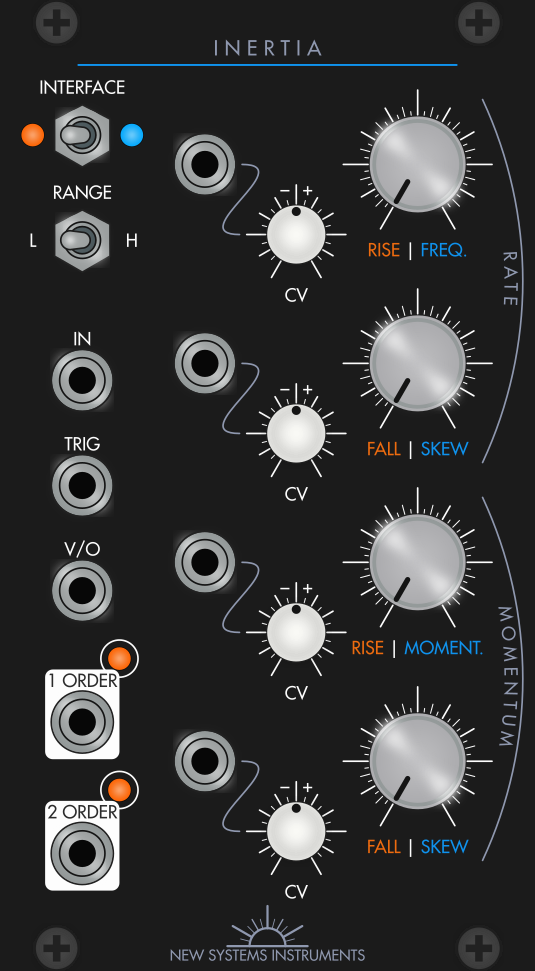Inertia

Inertia
$345 Inertia is a universal movement simulator. It generates output curves from input stimuli and the weight of its own motion—that is, its inertia.
Just as Newton described the motion of the planets and the motion of earthly bodies with a single set of laws, so too Inertia brings together several seemingly disparate musical functions with a single, elegant abstraction. Inertia can be used as:
- a rich oscillator with 5+ octaves of temperature-compensated V/O and CV over skew
- an LFO divider
- a filter with controllable resonance, from a light touch to screaming glitches
- an envelope generator with nuanced, natural sounding control over the minutiae of the attack and decay stages
- an intuitive sine wave skew LFO
- a phase locked loop
- a voltage controlled exponential slew limiter
- a slew limiter with controllable overshoot and settling (like a Wogglebug)
- a percussive sound generator
- and more uses that we haven't yet discovered
Inertia achieves all this complexity with simple controls. The exponential rate at which the output rises and falls can be set with the RISE and FALL controls. Inertia then follows an input signal according to these two rates, producing a first order and second order output. But things get interesting with the MOMENTUM controls. When you add some rise or fall momenta, the output signal exceeds its target in that direction before returning to its destination. With momentum, you can create ADSR-like envelopes, skewed filter resonance, etc. When MOMENTUM is all the way up, Inertia self-oscillates, acting like an LFO or VCO.
In addition to RISE/FALL mode, Inertia can be set to VALUE/SKEW mode, in which these same parameters are controlled as overall frequency (FREQ.), plus the SKEW between rise and fall rates, and overall momentum (MOMENT.), plus the SKEW between rise and fall momenta. an LED color and position indicates which mode is being used.
Inertia is inspired by the Dual Universal Slope Generator (DUSG), invented by Serge Tcherepnin for his Serge synthesizer system. Rather than duplicate the DUSG in a new wrapper, Inertia builds on the innovative, abstract impulse at the heart of the DUSG to create something different and new. This all-analog circuit is original both in concept and execution, but it grows in rich soil.
Specs
| Size | 14HP |
|---|---|
| Depth | 25mm |
| Power Consumption | +12V 72mA −12V 72mA |
| Timing Range | 50s–7ms (low), 7Hz–50kHz (high) |
| Tuning Accuracy | ~5 octaves |
| Self-Oscillation Range | −6V–+6V peak |
| Full I/O Range | −9.5V–+9.5V peak |
| Input Impedance | 50kΩ |
| Output Impedance | 150Ω |
| Output Drive | 2kΩ (min), 20kΩ+ (ideal) |
Videos
Thanks to Jesper Scherpenhuijsen for this video! Check out his YouTube channel The Modular Clubhouse.